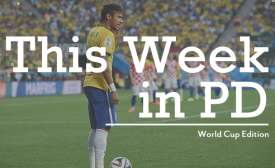sports diplomacy
Soccer used to be their game -- the Europeans, the South Americans, the Africans. Today it is our game too, bringing the nation together in a passionate embrace of its athleticism, its skill and, yes, its excitement. But it hasn't always been this way. Even after the U.S. hosted the World Cup for the first time in 1994 -- setting attendance records that still stand today -- many still dismissed soccer as somehow not quite American.
When al Shabaab, the violent Islamist group in Somalia, took control of the capital city Mogadishu, it actively destroyed buildings and overt displays of Western institutions and influences. This included outlawing soccer. The group destroyed cinemas and viewing centers in Mogadishu during the 2010 World Cup to stop residents from watching the matches. Their first successful international attack was the twin explosions in Uganda’s capital Kampala at viewing stations during the tournament.

Taking a closer look at the opportunities created by the World Cup this year, in Brazil and elsewhere.
Faced with a smothering and frustrating Italian defense in a must-win World Cup game Tuesday, the Uruguayan superstar responded with his front teeth. The incident, visible on television replays and circulating on the Internet, showed Suarez apparently bite the shoulder of Italy defender Giorgio Chiellini as the pair clashed in the Italian penalty area. The apparent chomp happened in an instant, but became a worldwide sensation and could lead to Suarez being kicked out of the World Cup.
The World Cup offers something of a free kick for soccer diplomacy, which some observers say U.S. President Barack Obama is failing to capitalize on. While many nations, from Germany to Russia, are sending their leaders to Brazil to make a diplomatic appearance, Obama is staying home.
While Rio de Janeiro and its famous beaches provide the touristic backdrop of the World Cup, the fevered grip of the world’s most popular sporting event can be felt even in some of the most isolated areas of the rain forest, where outsiders seldom visit. “Football is in our blood,” said Andre Pereira da Silva, 32, the chief of a small community of Sateré-Mawé Indians in Manaus, the largest city in the Amazon, who served as a guide.
When American fans win a major sporting event, they often like to celebrate by turning over cars and burning everything in sight. When Japanese teams lose, it turns out that fans commiserate by cleaning the stadium. On Saturday, Japan lost its first World Cup match with the Ivory Coast by 2-1. While that could have been a demoralizing start for most sports enthusiasts, a bunch of Japanese fans who attended the event at Arena Pernambuco in Recife, Brazil decided to respond with an unbelievably classy move: cleaning up the stadium.
Over the past 12 months, Huawei has signed deals with Borussia Dortmund (Germany), AC Milan (Italy), Arsenal (England), Paris Saint-Germain (France) and Ajax (Holland), all major European clubs who between them have won an average of four European trophies, 16 league championships and 11 domestic league cups.







